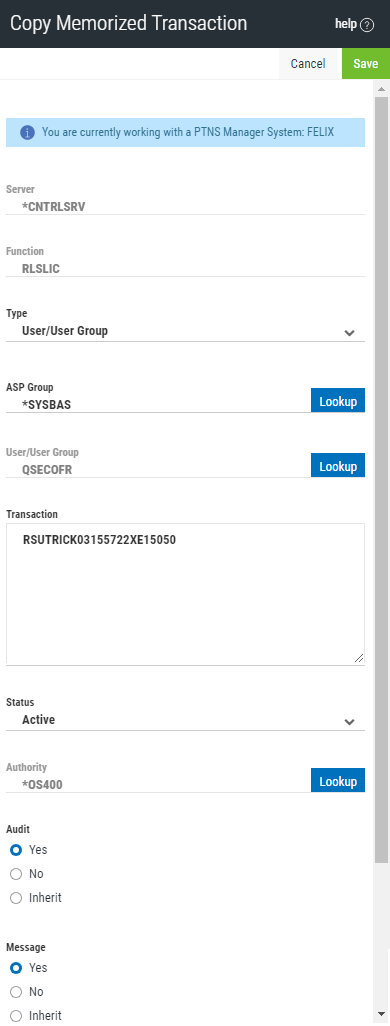
A screen similar to the one shown above is used to copy Rules, Object Lists, Memorized Transactions, and Pre-filters.
How to Get There
- On the Navigation Pane, choose Memorized Transactions.
- Click the
 icon adjacent to the IP Address Group you would like to copy and choose Copy.
icon adjacent to the IP Address Group you would like to copy and choose Copy.
What it Does
Use the Copy screen to copy Rules (User/Location/Object), Object Lists, Memorized Transactions, and Pre-filters to one or more Endpoints.
Options
Server
A Server in Exit Point Manager is a controlled entry point into your system. These entry points are determined and defined by IBM. Exit Point Manager has assigned easy-to-remember names to these controlled entry points.
Function
A Function, or Server Function, in Exit Point Manager represents a class of operations that a given Server may perform. For example, the *SIGNON Server classifies its operations as those pertaining to changing passwords, generating authentication tokens, and retrieving sign-on information. Exit Point Manager has assigned easy-to-remember names to these Functions, such as CHGPWD, GENAUTTKN and RETRIEVE.
Type
Specifies whether this is a User or Location rule.
ASP Group; Lookup
This is the name of an ASP Group. It is used in rule evaluation to determine if an object referenced in a transaction is the one specified on the object entries for this list.
Click Lookup to open the Select ASP Group screen where you can choose from the following ASP Groups:
*SYSBAS The Object List entries refer to those objects in *SYSBAS.
*ALL The Object List entries refer to those objects in any namespace.
User/User Group; Select
Choose this Lookup button to open the Users selection window where you can choose from a list of user profiles.
Transaction
The transaction data.
Status
This is the status of the Memorized Transaction.
Possible values are:
Exit Point Manager will attempt to match this transaction during rule enforcement. Memorized Transactions that are changed to *ACTIVE will have a matching User or Location rule changed to the corresponding action; *ALLOW to *MEMOS400, *REJECT to *MEMREJECT, or *SWITCH to *MEMSWITCH.
Exit Point Manager will not attempt to match this transaction during rule enforcement. Memorized Transactions that are changed to *INACTIVE will have the matching User or Location rule changed (if there are no other Memorized Transactions for that rule) to the corresponding action; *MEMOS400 to *ALLOW, *MEMREJECT to *REJECT, or *MEMSWITCH to *SWITCH.
Authority
Authority represents the action to be taken when a rule is found that matches the data present on a transaction.
Specify the Authority value for the new memorized transaction.
The list of valid values may include one or more of these values:
Audit
The Audit flag controls the logging of transactions to the Log Journal set up on the work with Exit Point Manager System Values panel.
Specify one of these values for Audit:
Message
The Send messages flag controls the sending of messages to the Log Message Queue set up on the work with Exit Point Manager System Values panel.
Specify one of these values for Send messages:
Capture
The Capture transactions flag controls whether transactions are remembered in Exit Point Manager for later memorization. Once captured, transactions can become Memorized Transactions which can act as rules.
Specify one of these values for Capture transactions:
Select which systems to save to
All managed systems are listed here. Check the systems you would like to save the IP Address group to. Or, check Select All to copy the IP Address Group to all managed systems.
Save • Cancel
Click Save to copy the IP Address Group to the selected system(s). Choose Cancel to dismiss the screen without making changes.